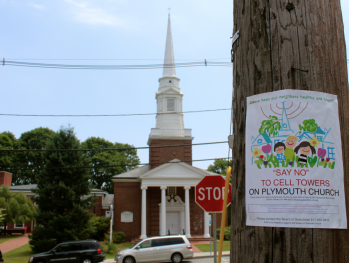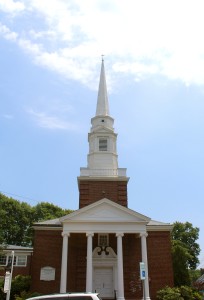Photo: The view from the front row.
A citizens petition that would have required an applicant seeking to install telecommunications equipment for interior spaces to obtain a Special Permit was handily defeated by Town Meeting Members at the Wednesday, June 7, Special Town Meeting.
The article, brought by neighbors of the Plymouth Congregational Church on Pleasant Street in an attempt to place a new roadblock to Verizon’s proposal to put six antennae in the church’s steeple, went down to crushing defeat, 164-89, not coming anywhere near the needed two-thirds approval margin to change the bylaw.
After the vote, a church representative said the installation of the cell equipment will now quickly move forward.
“I would anticipate, yes, it will be moving forward,” said Plymouth’s Chet Messer, who attended the Town Meeting vote.
“We indicated at the Planning Board hearing (in May) on this matter that we would have accepted whatever the town [meetings] decision was, and they have spoken,” said Messer.
For one of the leaders of the petition, the plans of those opposing the proposal are wide open.
“I think were disappointed that the scope of the discussion was so limited,” said Glenn Herosian, referring to Town Moderator Michael Widmer’s insistence the discussion steer clear of the issue of health and safety allegedly from cell towers. He pointed to federal legislation that prevents municipal or state governments from refusing to grant permits on that subject.
With the defeat of the citizens petition, the opponents have run out of governmental processes to question as Verizon won design and site review approval by the Planning Board, and the Historic District Commission signed off on the plan.
Herosian told the Belmontonian the next step for the opponents would be determined soon.
“We obviously are going to consider what our options are; we do have options,” he said.
Asked it, one venue was through the courts; Herosian was hesitant to commit to a legal challenge.
“We have counsel. But we certainly don’t want to do anything to add anymore disharmony to the neighborhood,” he said.
“We are disappointed that so many of the citizens of Belmont didn’t realize what an advantage they would have if they were able to employ experts at the expense of applicants or if they were able to have a meaningful discussion about the correct usages … of interior cell phone tower type installations,” said Herosian.
Presented by Precinct 4’s Judith Sarno, the article would have allowed nearby residents and businesses “to have their voice heard and have meaningful discussions during a special public hearing.”
“The Special Permit process takes a more transparent comprehensive and considered approach … then the limited design and site plan review.” Sarno noted Belmont’s bylaw regulating cell towers had not been updated in the past two decades, “this article goes a long way in catching up to those of our neighbors” Lexington, Arlington and Watertown have each taken steps to require applicants to submit to the Special Permit process.
The new requirement would also review auxiliary impacts from the antenna including the use of generators and when testing and servicing the equipment would occur. It would also ask the applicant to attempt first to place the material on municipal buildings and properties.
“By requiring a Special Permit, we ensure that these installations will require a public process which neighboring residents are given an opportunity to provide meaningful input into the decision-making whether they are in favor … or opposed to it,” said Sarno.
If Sarno or the petitioners were hoping for a groundswell of support that proponents of the successful Special Town Meeting article to corral the construction of “mega-homes” instead found a growing number of Town Meeting members waiting in line to speak against the measure.
Bob McLaughlin, Precinct 2, said he was troubled with what he said is a “built in preference” to place the telecommunication equipment on a town building.
“As a Town Meeting member, I’m here to represent citizens, people who own property, and people who have the income from a Verizon (tower) … and we should not be competing with our constituents” especially since the town has the power to make law that “tilts the competition in favor of Belmont,” he said.
As for transparency in the review process, McLaughlin stated he “doesn’t care what goes on in your attic or your building, and you shouldn’t care what goes on in my attic,” to the applause of the meeting.
He added that a Special Permit should only be used when there is a countervailing public good that outweighs it, ” but I don’t see it.”
“There is one good reason for a Special Permit process, and that’s because it’s great for lawyers,” said McLaughlin, a long-time attorney.
Those members for the article approved of adding more opinions and transparency from telecommunication firms in the process. Steven Pinkerton. Precinct 7, who “had no dog in this fight,” said the added dialogue among neighbors before the Zoning Board Appeals “and not on the street” would result in the installation of much-needed cell coverage “just more carefully designed.”
Helen Golding, Precinct 1, believed the article was a “Trojan Horse” where issues of how the equipment would be used and maintained were “hiding” the opponents health concerns that is prohibited by federal law.
“This is just subterfuge. I feel as if the applicants have not been transparent,” said Golding.
Melissa Irion, Precinct 8, who complained that “I can’t get a decent cell phone call” on Dean Street, said the article was just another “unfair measure against business and development in town. Better service makes us a more desirable town.”
Ellen Schreiber, Precinct 8, said the introduction of the Special Permit process will not be “simple or quick” as advertised by proponents, especially if there is considerable opposition to the tower.
Schreiber added that spotty cell reception in Belmont Center and the Winn Brook neighborhood was a public safety issue. She pointed to data that found that two of every five calls to Belmont 911 comes from a cell phone, a trend that is only growing.
“If you can’t call 911 and 41 percent who call 911 uses a cell phone … that is a public safety issue,” she said.
There were only two attempts to tread on possible health worries, each time to the consternation of the assembled members. Selectmen Vice Chair Sami Baghdady, who along with Jim Williams voted for “favorable action” on the article, explained his vote by saying that regardless of what the scientific or medical studies may say, “wireless telecommunication facilities or cellular antennas do incite public concern and panic” if placed in a residential neighborhood.
“Imagine having a cellular antenna in close proximity to where your children sleep or where your children play,” said Baghdady before the meeting exploded in jeering and catcalls as Widmer said the comments were “beyond the scope.” Baghdady concluded that he sought “meaningful dialogue” to “mediate concerns” that residents do not have within the design and site review process.
Dr. Martin Steffen of School Street and Boson Univeristy Medical Center – who was providing the petitioners with scientific insight and expertise – called an earlier assertion that cell towers produced 50 watts of energy (compared to a light bulb) “a real red herring” as it was not from radiofrequency radiation. He then submitted that such radiation “creates health effects” an assertion left unexplained as Widmer ruled that line of inquiry “out of order.”
When the vote was flashed on the screen, the margin surprised members since the petition had signees from each of Belmont’s eight precincts.
After the meeting, Herosian told the Belmontonian that it appeared to him that there were “more personal issues [expressed by Town Meeting Members] verses really clear efforts to improve the way the town manages its utilities and manages its neighborhoods.”
Herosain said the crux of the issue is not the short term use of a cell phone to make a call; it’s the long-term, 24/7 exposures are not part of the current FCC criteria.”

